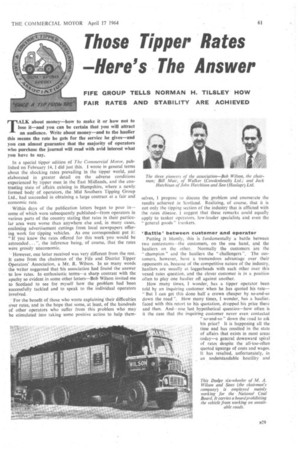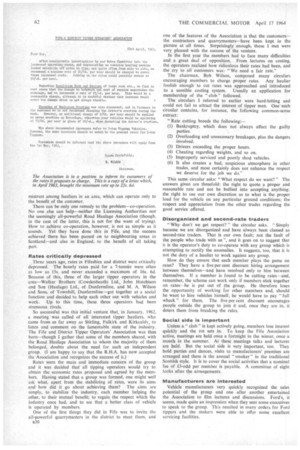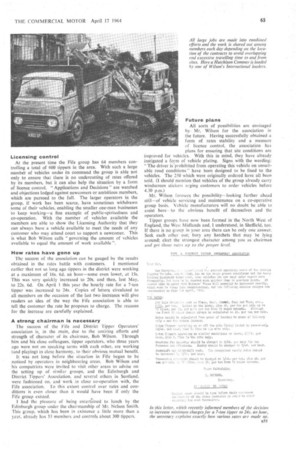Those Tipper Rates —Here's The Answer
Page 63

Page 64

Page 65

If you've noticed an error in this article please click here to report it so we can fix it.
FIFE GROUP TELLS NORMAN H TILSLEY HOW FAIR RATES AND STABILITY ARE ACHIEVED TALK about money—how to make it or how not to lose it—and you can be certain that you will attract an audience. Write about money—and to the haulier this means the rate he gets for the service he gives—and you can almost guarantee that the majority of operators who purchase the journal will read with avid interest what you have to say.
In a special tipper edition of The Commercial Motor, published on February 14, I did just this. I wrote in general terms about the shocking rates prevailing in the tipper world, and elaborated in greater detail on the adverse conditions experienced by tipper men in the East Midlands, and the contrasting state of affairs existing in Hampshire, where a newly. formed body of operators, the Mid Southern Tipping Group Ltd., had succeeded in obtaining a large contract at a fair and economic rate.
Within days of the publication letters began to pour in— some of which were subsequently published—from operators in various parts of the country stating that rates in their particular area were worse than anywhere else and, in many cases, enclosing advertisement cuttings from local newspapers offering work for tipping vehicles. As one correspondent put it: " If you knew the rates offered for this work you would be astounded ... ", the inference being, of course, that the rates were grossly uneconomic.
' However, one letter received was very different from the rest. It came from the chairman of the Fife and District Tipper Operators' Association, a Mr. R. Wilson. In so many words the writer suggested that his association had found the answer to low rates. In enthusiastic terms—a sharp contrast with the apathy so evident in some other letters—Bob Wilson invited me to Scotland to see for myself how the problem had been successfully tackled and to speak to the individual operators involVed.
For the benefit of those who wrote explaining. their difficulties over rates, and in the hope that some, at least, of the hundreds of other operators who suffer from this problem who may be stimulated into taking some positive action to help them
selves, I propose to discuss the problem and enumerate the results achieved in Scotland. Realizing, of course, that it is not only the tipping section of the industry that is afflicted with the rates disease, I suggest that these remarks could equally apply to tanker operators, low-loader specialists and even the " general goods" trunkers.
'Battle' between customer and operator . Putting it bluntly, this is fundamentally a battle between two coutestants—the customers, on the one hand, and the hauliers on the other. Normally the customers arc the "champion" and the hauliers the "challengers". The customers, however, have a tremendous adVantage over their opponents as, because of the competitive nature of the industry, hauliers are usually at loggerheads with each other Over this vexed rates question, and the clever customer is in a position often to play one haulier off against another.
How many times, I wonder, has a tipper operator been told by an inquiring customer when he has quoted his rate" But I can get this done half a crown cheaper by so-and-so down the road ". How many times, I wonder, has a haulier, faced with this retort to his quotation, dropped his price there and then. And—one last hypothetical question—how often is it the case that the inquiring customer never even contacted " so-and-so " down the road to ask his price? It is happening all the time and has resulted in the state of affairs that exists in most areas today—a general downward spiral of rates despite the all-too-often quoted upsurge of costs and wages. It has resulted, .unfortunately, in an understandable hostility and
mistrust among hauliers in an area, which can operate only to the benefit of the customer.
There can be only one remedy to the problem—co-operation. No one else can help--neither the Licensing Authorities nor the seemingly all-powerful Road Haulage Association (though, in the case of the latter, this is not for the want of trying). How to achieve co-operation, however, is not as simple as it sounds. Yet they have done this in Fife, and the success achieved there has been passed on to neighbouring areas in Scotland—and also in England, to the benefit of all taking part.
Rates critically depressed _Three years ago, rates in Fifeshire and district were critically depressed. The hourly rates paid for a 7-tonner were often as low as 15s. and never exceeded •a maximum of 16s. 6d. Because of this, three of the larger tipper operators in the area—Walker Brothers (Cowdenbeath) Ltd., John Hutchison and Son (Haulage) Ltd., of Dunfermline, and M. A. Wilson and Sons, of Townhill, Dunfermline—got together at a social function and decided to help each other out with vehicles and work. Up to this time, these three operators had been strenuous rivals.
So successful was this initial venture that, in January, 1962, a meeting was called of all interested tipper hauliers, who came from as far away as Stirling, Falkirk and Kirkcaldy, to listen and comment on the lamentable state of the industry, The Fife and District Tipper Operators' Association was thus born—though I gather that some of the members shared, with the Road Haulage Association to whom the majority of them belonged, doubts about the need for such an independent group. (I am happy to say that the R.H.A. has now accepted the Association and recognizes the success of it.) • Rates were the main and immediate concern of the group and it was decided that all tipping operators would try to obtain the economic rates proposed and agreed by the members. Having stated that a group was formed, one might well ask what. apart from the stabilizing of rates, were its aims and how did it go about achieving them? The aims are simply, to stabilize the industry, each member helping the other, to their mutual benefit; to regain the respect which the industry once had, and to see that a better class of vehicle is operated by members.
One of the first things they did in Fife was to invite the all-powerful quarrymastcrs in the district to meet them, and B30 one of the features of the Association is that the customers— the contractors and quarrymasters—have been kept in the picture at all times. Surprisingly enough, those I met were very pleased with the success of the venture.
In the first year the members had to face many difficulties and a great deal of opposition. From lectures on costing, the operators realized how ridiculous their rates had been, and the cry to all customers was: "We need a fair rate."
The chairman, Bob Wilson, composed many circulars encouraging members to charge proper rates. Any haulier foolish enough to cut rates was approached and introduced to a sensible costing system. Usually an application for membership of the " club " followed.
The circulars I referred to earlier were hard-hitting and could not fail to attract the interest of tipper men. One' such circular contains, for instance, the following common-sense extract:
"Rate cutting breeds the following:—
(I) Bankruptcy. which does not always affect the guilty parties.
(2) Overloading and unnecessary breakages, plus the dangers involved.
(3) Drivers exceeding the proper hours.
(4) Cheating regarding weights, and so on.
(5) Improperly serviced and poorly shod vehicles.
(6) It also creates a bad, suspicious atmosphere in other trades, and most certainly does not enhance the respect we deserve for the job we do."
This same circular asks': "What respect do we want?" The answers given are threefold: the right to quote a proper and reasonable rate and not be bullied into accepting anything; the right to use our own discretion as to what is the proper load for the vehicle on any particular ground conditions; the respect and appreciation from the other trades regarding the good service offered.
Disorganized and second-rate traders "Why don't we get respect?" the circular asks. "Simply because we are disorganized and have always been classed as second-rate traders. That is our own fault; not the fault of the people who trade with us ", and it goes on to suggest that it is the operator's duty to co-operate with any group which is attempting to rectify the anomalies. It suggests, too, that it is not the duty of a haulier to work against any group.
How do they ensure that each member plays the game on rates? They have a five per cent discount hiring arrangement between themselves—and have resolved only to hire between themselves. If a member is found to be cutting rates—and, remember, the scheme can work only if members stick together on rates--he is put out of the group. He therefore loses the opportunity of working for other members and, should he want to hire vehicles himself, he would have to pay "full whack for them. The five per cent discount encourages people outside the group to join it and, once they are in, it deters them from breaking the rules.
Social side is important Unless a " club " is kept actively going, members lose interest quickly and the rot sets in. To keep the Fife Association active, meetings are held once a fortnight in the winter, once a month in the summer. At these meetings talks and lectures are held. But the social side is very important, too. They hold parties and dances, visits to manufacturers' premises are arranged and there is the annual " smoker " in the traditional Scottish style. It is to cover the social activities that a nominal fee of 0-odd per member is payable. A committee of eight looks after the arrangements.
Manufacturers are interested Vehicle manufacturers very quickly recognized the sales potential of the group and one after another entertained the Association to film lectures and discussions. Ford's, it seems, made quite an impression when they sent some executives to speak to the group. This resulted in many orders for Ford tippers and the makers were able to offer some excellent servicing facilities. Licensing control At the present time the Fife group has 64 members controlling a total of 600 tippers in the area. With such a large numb& of vehicles under its command the group is able not only to ensure that there is no undercutting of rates offered by its members, but it can also help the situation by a form of licence control. "Applications and Decisions" are watched and objections lodged against newcomers or ambitious members, which are pursued to the full. The larger operators in the group, if work has been scarce, have sometimes withdrawn some of their vehicles, enabling the smaller one-man businesses to keep working—a fine example of public-spiritedness and co-operation. With the number of vehicles available the members are able to show the Licensing Authority that they can always have a vehicle available to meet the needs of any customer who may attend court to support a newcomer. This is what Bob Wilson calls "governing the amount of vehicles available to equal the amount of work available ".
How rates have gone up The success of the association can be gauged by the results obtained in the rates battle with customers. f mentioned earlier that not so long ago tippers in the district were working at a maximum of 16s. 6d. an hour—some even lower, at 15s. This was very quickly increased to 20s. and then, last May, to 22s. Ed. On April 1 this year the hourly rate for a 7-ton tipper was increased to 245. Copies of letters circulated to all members on the occasion of the last two increases will give readersan idea of the way the Fife association is able to tell the customer the rate he proposes to charge. The reasons for the increase are carefully explained.
A strong chairman is necessary The success of the Fife and District Tipper Operators' association is in the main, due to the untiring efforts and strength of character of its chairman, Bob Wilson. Through him and his close colleagues, tipper operators, who three years ago were not on speaking terms with each other, are working (and playing) in close harmony, to their obvious mutual benefit.
It was not long before the situation in Fife began to be noticed by operators in neighbouring areas. Bob Wilson and his compatriots were invited to visit other areas to advise on the setting up of similar groups, and the Edinburgh and District Tippers' Association, and several others in Scotland, were fashioned on, and work in close co-operation with, the Fife association. To this extent control over rates and conditions is even closer than it would have been if only the Fife group existed.
.I had the pleasure of being entertained to lunch by the Edinburgh group under the chairmanship of Mr. Nelson Smith. This group, which has been in existence a little more than a year, already has 13 members and controls about 300 tippers: Future plans
All sorts of possibilities are envisaged byMr. Wilson for the association in the future. Having successfully obtained a form of rates stability and a Measure of licence control, the association has plans for ensuring that site conditions are improved for vehicles. With this in mind, they have already instigated a form of vehicle plating. Signs with the wording: " The driver is prohibited from operating this vehicle on unsuitable road conditions" have been designed to be fixed -to the vehicles. The 250 which were originally ordered have all been sold. (I should mention that vehicles of the group already carry windscreen stickers urging customers to order vehicles before 4.30 p.m.)
Mr. Wilson foresees the possibility—looking further ahead still—of vehicle servicing and maintenance on a co-operative group basis. Vehicle manufacturers will no doubt be able to assist here----to the obvious benefit of themselves and the operators.
Tipper groups have now been formed in the North West of England, the West Midlands and, I understand, in Sheffield, too. If there is no group in your area there can be only one answer. Seek each other out; bury any hatchets that may be lying around; elect the strongest character among you as chairman and get those rates up to the proper level.




































































































































